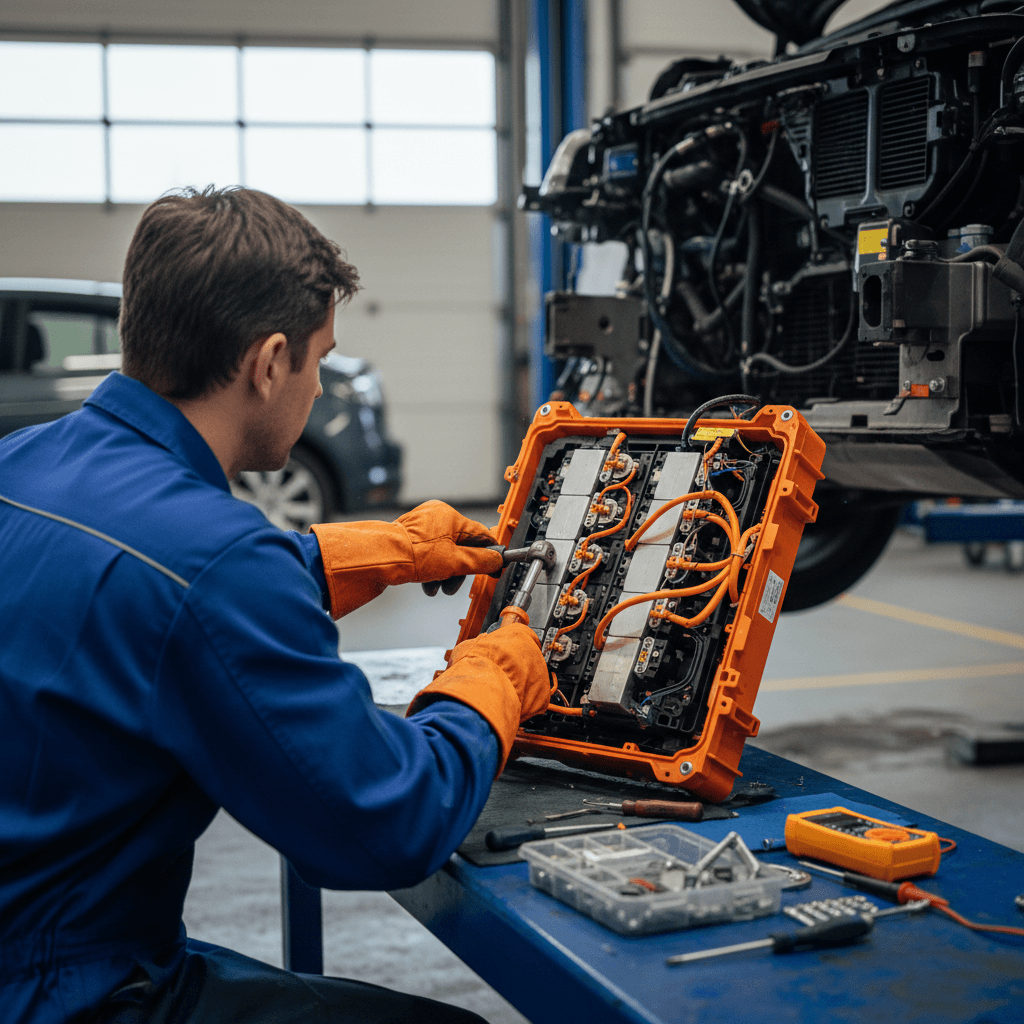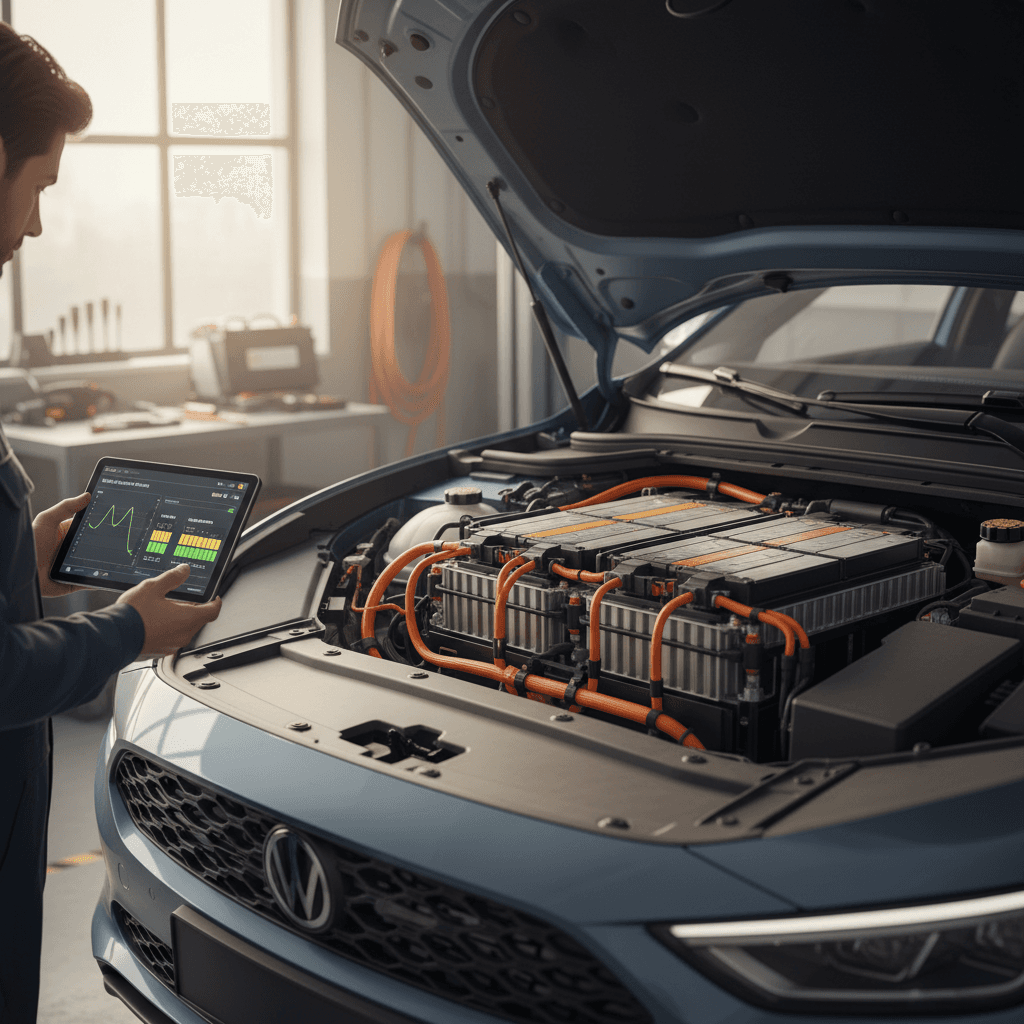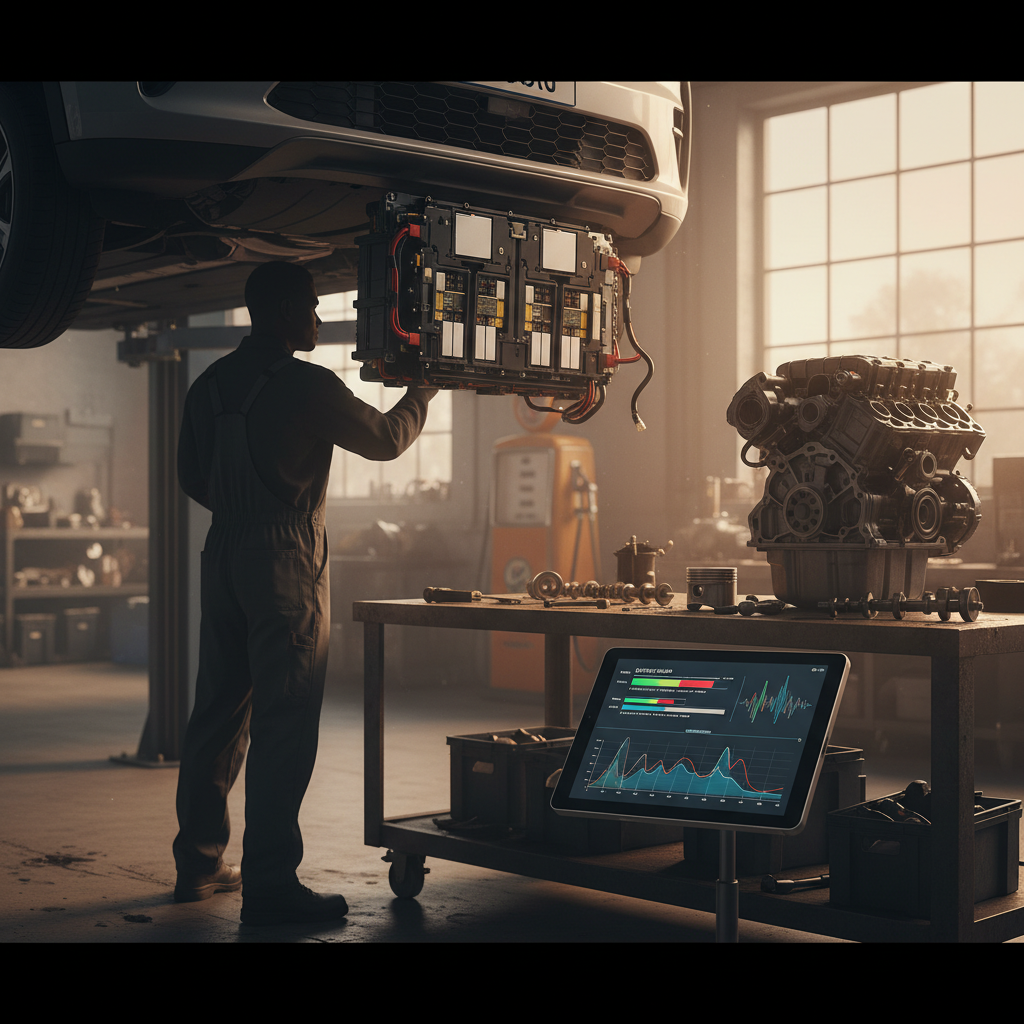You type “EV repair near me” into your phone and the results look…thin. Maybe you see a couple of dealer service centers, a generic tire shop, and one mysterious “EV specialist” across town. Owning an electric car is supposed to be simpler than owning a gas car, so why is it so hard to figure out where to fix it when something goes wrong?
EVs Need Less Maintenance, But Repairs Are Different
Why EV Repair Near You Feels Different Than Gas-Car Repair
If you’ve owned gas cars for years, you’re used to having a dozen repair options within a short drive, dealers, independents, national chains. With an EV, the map looks different. There are fewer EV-certified shops, dealers hold more of the expertise, and the line between “software problem” and “hardware failure” is blurry. At the same time, EVs are showing up in repair bays more often as the fleet ages and sales grow.
EV Repair Is Growing Fast in 2025
Behind those numbers is a reality you’ll feel locally: capacity is tight, training is uneven, and scheduling can be a pain. That’s why it pays to understand the different types of EV repair options, so you can call the right place the first time.
Where to Go for EV Repair Near You
Four Main Places to Get EV Repair Near You
Each has strengths and trade-offs. The right answer depends on your issue, warranty, and budget.
1. Brand Dealership or OEM Service Center
Best for: Warranty work, recalls, complex high-voltage issues, latest software updates.
- Factory-trained techs and dedicated EV bays on newer facilities.
- Direct access to OEM diagnostic tools and parts.
- Higher labor rates, often 20–30% more than independents.
If your EV is still under bumper-to-bumper or battery warranty, the dealer is usually your first call.
2. Independent EV Specialist
Best for: Out-of-warranty EVs, routine repairs, aftermarket upgrades, cost-conscious owners.
- Lower hourly rates than dealers in most markets.
- Often started by ex-dealer techs who love EVs.
- May focus on a few brands (e.g., Tesla, Nissan, Hyundai/Kia).
Search phrases like “EV specialist near me” or check local EV owner groups to uncover these shops.
3. General Repair Shop With EV Certification
Best for: Brakes, tires, suspension, A/C, 12-volt systems, jobs similar to gas cars.
- Often part of a national chain or regional network.
- May have one or two techs trained on high-voltage safety.
- Not ideal for deep battery or drivetrain work.
Ask directly: “Do you regularly work on EVs? What brands?”
4. Mobile EV Repair & Remote Service
Best for: Minor repairs, diagnostics, software issues, and convenience maintenance.
- Tech comes to your home or office, no tow, no waiting room.
- Can handle tires, 12-volt batteries, some cooling and charging issues.
- Limited for heavy mechanical or collision work.
Check whether your EV brand offers factory mobile service and look for local EV-focused mobile outfits.
How to Search Smarter Than “EV Repair Near Me”
Common EV Repairs and What They Cost
When you look for EV repair near you, the stakes can feel high because headlines love to shout about five-figure battery bills. The reality is more nuanced. Most EV repairs are familiar automotive work, suspension, climate control, 12-volt batteries, with a smaller slice involving high-voltage components and sophisticated electronics.
Typical EV Repairs You’ll See on Estimates
Ballpark ranges in U.S. dollars. Actual costs vary by brand, region, and parts availability.
| Repair Type | Where It’s Usually Done | Typical Cost Range | Notes |
|---|---|---|---|
| 12V battery replacement | Dealer, independent, mobile | $200 – $450 | Very common; EVs still rely on a conventional 12V battery for computers and locks. |
| Brake service (pads/rotors) | Independent, chains, dealer | $250 – $900 | Regenerative braking means pads often last longer than on gas cars. |
| Suspension components (shocks, arms, bushings) | Dealer, independent | $500 – $1,500+ | Heavier EVs can be harder on suspension; shop doesn’t need EV-only tools. |
| A/C compressor or major HVAC repair | Dealer, EV specialist | $900 – $2,500 | Important for battery thermal management on many EVs. |
| Charge port / inlet repair | Dealer, EV specialist | $150 – $700 | Ranges from simple socket replacement to harness and module work. |
| On-board charger module | Dealer, EV specialist | $1,500 – $3,500+ | Controls AC charging; failure can mimic a bad wall charger. |
| High-voltage battery module repair | Specialist, some dealers | $2,000 – $8,000+ | Module-level repairs are often cheaper than full pack replacement. |
| Full battery pack replacement (out of warranty) | Dealer, battery specialist | $8,000 – $20,000+ | Price varies wildly by model; many owners never face this during normal ownership. |
| Software / control unit diagnosis & reprogramming | Dealer, specialist, mobile | $150 – $400 | Often a flat diagnostic fee plus any software updates or module replacements. |
Use these as directional ranges when comparing quotes from local shops.
Sticker Shock Is Real, So Is Over-Repair
How to Evaluate an EV Repair Shop
1. Training, Tools, and Certifications
- Ask how many EVs they service each week and which brands.
- Look for OEM certifications (Tesla, Ford, GM, Hyundai/Kia, VW, etc.) or recognized EV training programs.
- Confirm they have insulated tools, EV-rated lifts, and high-voltage safety gear.
2. Transparency, Pricing, and Communication
- Clear written estimates with line-item labor and parts.
- Photos or video walk-throughs of findings, especially for big jobs.
- Willingness to explain why a component failed and what your options are.
Questions to Ask Before You Book EV Repair Near You
1. How often do you work on my specific EV model?
EVs aren’t interchangeable. A shop that sees your model weekly will move faster and is less likely to use trial-and-error diagnostics.
2. Are your technicians trained and certified on EV high-voltage systems?
You want more than a generic "we work on everything." Ask what training they’ve completed and how many EV-qualified techs are on staff.
3. What diagnostic fee do you charge, and is it applied to the repair?
EV diagnostics can take hours on complex faults. Knowing the upfront fee, and whether it’s credited toward the repair, prevents surprises.
4. Will you use OEM, remanufactured, or used parts?
For high-voltage components and safety-related parts, OEM or high-quality remanufactured pieces are usually worth the premium.
5. How do you handle warranty or recall issues?
Some independents will diagnose the issue, then send you to the dealer for free warranty work. That can save you time and money.
6. Do you provide a written warranty on EV repairs?
Look for at least 12 months/12,000 miles on parts and labor. Some EV specialists go longer to stand behind their work.
Quick Compatibility Check
EV Collision Repair Near Me

A parking-lot tap is one thing. A frame hit, airbag deployment, or wheel pushed back into the fender is another. When an EV is in a real crash, you’re no longer just fixing paint and panels, you’re protecting a high-voltage battery that can be damaged or stressed in ways you can’t see.
Choosing an EV-Ready Collision Center
Body work on a modern EV is as much about electronics and thermal management as paint and panels.
Look for EV Certifications
Many major insurers now maintain lists of EV-certified collision centers. These shops invest heavily in structural repair training, battery handling, and safety procedures.
Ask About Battery Inspections
After a hard hit, the shop should follow manufacturer procedures to inspect and electrically isolate the high-voltage battery. That may involve factory scan tools and thermal checks.
Expect Higher Estimates
EV collision repairs can run higher than gas cars due to part costs, calibration work, and extra labor. Make sure you’re using a shop that understands how to repair, not just replace.
Safety First After a Crash
Mobile EV Repair and Remote Service
When you search for EV repair near me, you may not need a shop at all. Many automakers and independent providers now offer a mix of remote diagnostics and mobile service vans that can handle a surprising range of jobs in your driveway.
- Software updates and feature unlocks (often over-the-air).
- Diagnostic scans for warning lights before you schedule in-person repair.
- 12V battery testing and replacement on-site.
- Minor hardware fixes like charge port doors, trim pieces, or sensors.
- Tire rotations, wiper blades, cabin filters, and other light maintenance.
How to Use Remote Diagnostics to Your Advantage
EV Repair Considerations for Used EV Buyers
If you’re shopping the booming used EV market, repair and service access should be part of your decision, not an afterthought. A great price is less exciting if the only qualified shop is 90 minutes away.
Check the Service Map Before You Buy
- Use brand websites and dealer locators to see where EV-certified service centers are.
- Search “[your city] + [model] + service” to see if independents work on that car.
- Look at how close you are to an EV-ready collision center, not just a mechanical shop.
Get a Battery & Health Report
- Ask for documentation of battery state-of-health, DC fast-charging history, and warranty status.
- Have a qualified EV technician or service center perform a pre-purchase inspection.
- On platforms like Recharged, each vehicle includes a Recharged Score Report with verified battery health and pricing insights, so you’re not guessing about future repair risk.
How Recharged Helps With the “Repair” Question
FAQ: EV Repair Near Me
Frequently Asked Questions About EV Repair Near You
The Bottom Line on Finding EV Repair Near You
EVs really are simpler machines than the gas cars they’re replacing, but the repair landscape around them is still catching up. When you search for “EV repair near me”, you’re not just looking for the closest shop. You’re looking for the right mix of training, tooling, and transparency for the way you drive and the EV you own.
Map out your options now: identify a brand dealer, an independent EV specialist if you have one, a collision center that’s EV-ready, and any mobile service available in your area. If you’re still shopping for a car, use tools like the Recharged Score Report and EV-specialist guidance from Recharged to choose a used EV that matches the service reality where you live, not just the sticker price. That way, the next time something does go wrong, you’ll already know exactly who to call, and you can get back to enjoying the quiet, instant-torque life you bought the EV for in the first place.

